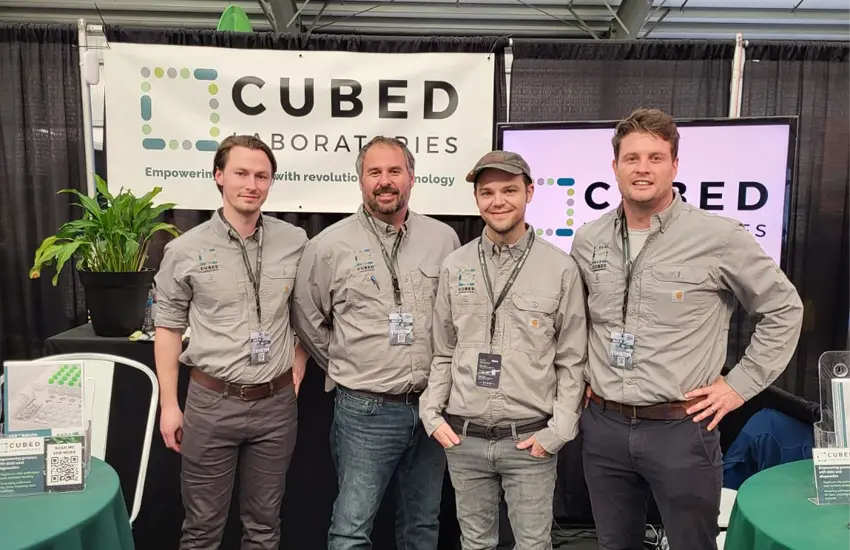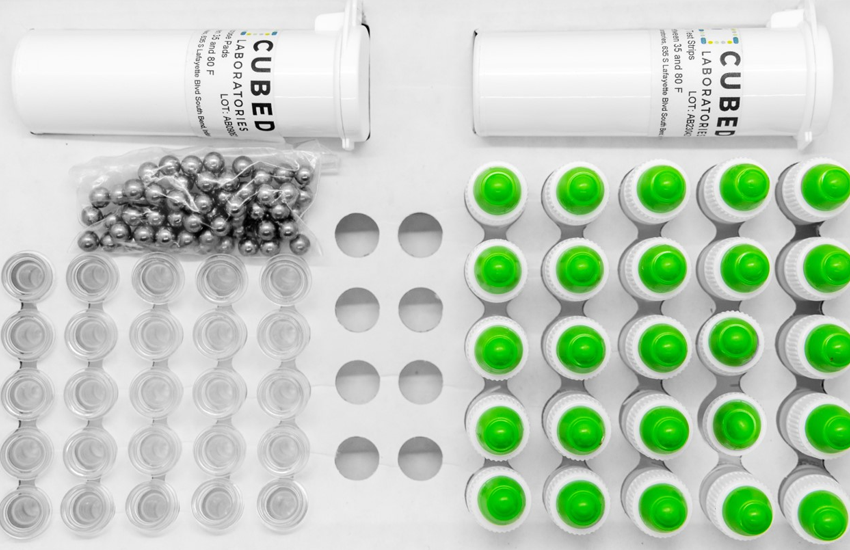Notifications

11 minutes, 7 seconds
-20 Views 0 Comments 0 Likes 0 Reviews

In the world of cannabis cultivation, an ounce of prevention is worth far more than a pound of cure. Having the ability to fully grasp the health of the plants throughout their lifecycles helps guarantee higher yields and better quality while simultaneously reducing the risk of crop loss.
Cubed Labs provides farmers peace of mind with rapid in-field nutrient and pathogen testing, data capture, and interpretation. The company currently offers easy to use tests and are currently developing even more advanced detection tools, including tests for powdery mildew. Their CRD Scout app captures and tracks any issues in the grow with photo detection technology that’s simple yet powerful.
Discover more about Cubed Labs and how they’re helping cultivators thrive in this exclusive Leafwire Q&A with Vice President of Business Development Michael Prows.
Leafwire: How did the relationship with Cubed Labs evolve?
MP: We were working on a testing technology for the food safety industry and they asked me about testing for pesticides, heavy metals, and other targets. At the time I was really looking for potency tests for producers, nutrient testing, and then the big pathogen tests: bud rot, botrytis tests, powdery mildew, pythium, some of the pathogenic tests.
I asked them if we could use that technology, especially pathogen testing, on the farm. I thought if we could get ahead of those big issues, it would be of interest to the industry. So, we pivoted.
LW: What was your go-to market product?
MP: The first test we have out now is for botrytis. It’s a lateral flow device that takes 10 minutes, it's very similar technology to the at-home COVID test. If you're concerned about something, you can just run a test to get early detection results right away. It's very easy, anybody can do it. I say it's like one more step than testing your pH; where you scoop up the water, put the drops in, shake it up and then compare to the color chart. The only extra steps to run our test is to stick a test strip in and compare the results to a graph.
LW: What is your brand promise?
MP: When I met Cubed Labs, they asked: What does the market want? My interpretation is live data.
We wanted to be able to focus on plant health, as a preventative measure versus “just spray it.” We're addressing it a little bit differently where you're just testing the plant health measures, including nutrients, where you can avoid most of those problems, whether it's pathogenic or pests, and give the plants a chance to fight them off themselves.
LW: What is the CRD Scout platform?
MP: CRD stands for Cubed Rapid Diagnostics. The Scout platform is our first software app. It all starts with image capture which is done directly through the app. Then you mark the location after the photo and report what you see. You can map out your garden, whether it's an indoor greenhouse or a large acreage plot. You can go down to the individual plant or if you're a large acreage hemp farmer, you can do it by the acre, whatever you choose.
If you have a nutrient issue, if you see some burning tips, some pest in the growth space or you suspect a pathogen, whatever it is, you mark it down, write some notes, and post it to a live feed for everybody involved in the organization to see what's happening with the plants directly. It’s a new take on IPM protocols.
We're currently integrating our pathogen tests, so you can photograph test results and track the results in the app. It will even be able to quantify the levels of the pathogen. For example, you can run a botrytis test, upload a photo and then Scout gives you a specific pathogen level. After that, we'll be integrating our N-Sight device that is used for the nutrient, plant health scan and potency testing.

LW: Could this technology become mandatory through regulation?
MP: We don’t intend for our tests to become mandatory. But I think we can really help people. We have spoken to some regulators in the state of Colorado, and we're working with some people in California as well. Our potency test is accurate enough to detect down to 0.2 percent of THC. You could use our test to tell if the crop is hot or not.
In our next test coming out, we'll be able to catch Aspergillus, Penicillium, fusarium, and botrytis, all of the main microbial agents that prevent people from selling their products. I don't think that we will replace lab results but as far as the farmers are concerned we’ll allow them to know exactly what's going on with enough time to remediate.
The other thing that we're seeing is that several groups are using our tests as a kind of service record. So when you go to the market, sell wholesale or to a dispensary, you can show the history of the crop with photo capture and test results all the way through. Transparency and clarity are key, so you can get a report on the crop health but don't have to get into the nitty-gritty of what the farmers are doing. But I think confirming that you didn't need to spray because you were testing regularly will become something that can set farmers apart in the industry.
LW: What advice do you have for people looking to enter this space?
MP: Being able to replicate things is so critical. I've seen so many farmers who are always trying new technology, new nutrients, new pH, chasing humidity — they're always changing things. And if I ask a farmer, what's their cost of production, per pound, or whatever their metric is, almost nobody knows how much it costs them per pound. Only the exceptional growers who have tracked everything meticulously and don't change things, except in a controlled setting where they can experiment on one thing at a time can answer that.
You need to be precise, so things like testing using laboratories. I'd recommend sap analysis, tissue samples, our pathogen tests — any point of data that can help you steer the crop, reduce input costs, and increase yield is going to pay dividends. Make sure you track and monitor everything you possibly can so that you know where you are compared to the last point in time throughout the growth cycle. That way you know if you are improving. But if you don't measure it, you'll never get there.
LW: What else should the industry know about Cubed Labs?
MP: Our N-Sight plant health testing system is revolutionary. We'll be able to test for chlorophyll, sugar, Brix level in the leaf as well as in the flower, protein content, fats and lipids, potency, NPK, Cal mag sulfur — we will be able to give you a live reading on those things. Then by bringing in some traditional agronomists to look at this these points of data we have a whole new way too look at plant health. Instead of environmental first, it's all about planning and health first. Over the next two years we will be optimizing N-Sight not just for cannabis, but for all crop production at large.
I think that's the biggest thing coming out of Cubed Labs. Instead of just relying on what you've done and past results, you can make changes accurately by using a scientific method. If you're low on calcium, you now know by how much. If you're low on potassium, you'll now be able to know by how much and adjust accordingly without any extra inputs. You eliminate some of those risks.
Testing Cultivation Cannabis Cannabis business Cannabiz B2B Grow Pathogen Test Powdery mildew

We believe in the power of connections. Our platform is more than just a social networking site; it's a vibrant community where individuals from diverse backgrounds come together to share, connect, and thrive.
We are dedicated to fostering creativity, building strong communities, and raising awareness on a global scale.
Share this page with your family and friends.